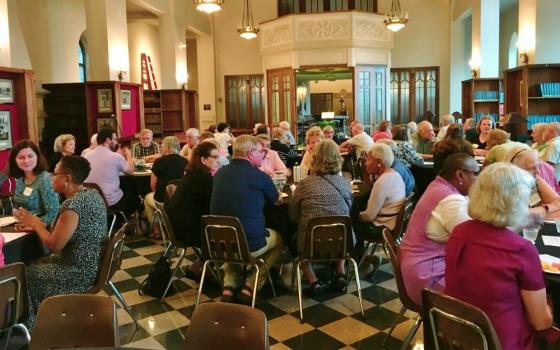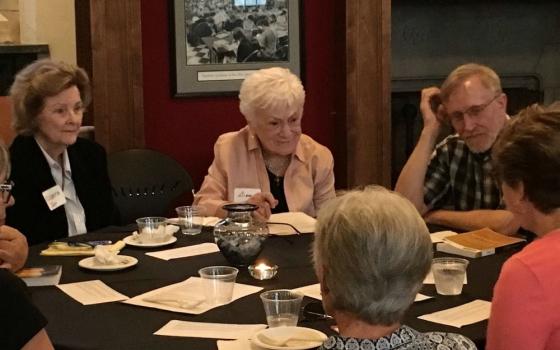Changes in church governance structures and increased inclusion of the laity, particularly women, were themes expressed Oct. 9 at a forum at Dominican University to respond to reports exposing sexual abuse in the U.S. Catholic Church.
The event was sponsored by the Siena Center, a Dominican University initiative to pursue scholarship regarding the church and social issues. About 60 people, most of whom were connected with the university, listened to brief remarks from Sr. Diane Kennedy, a Sinsinawa Dominican and the university's retired vice president of mission and ministry; the Rev. Elizabeth Ritzman, an ordained minister in the American Baptist Church USA and the director of the university's Wellness Center; and Mark Laboe, the vice president for university ministry at DePaul University. Listeners then shared their thoughts about the abuse in small groups at tables.
Kennedy said the church is wounded, and sexual abuse isn't just a problem for the American church, but a worldwide ecclesial problem.
"Pedophilia is a pathology," she said, noting it wasn't well understood several decades ago. "Ignorance allowed dioceses to return [offenders] to ministry after supposed treatment for misconduct. We don't think that way anymore."
She said sexual abuse in the church is both a personal and a structural sin.
"In the church has been a culture of silence because of a clerical caste system," she said. "Decades of misconduct were not addressed."
Kennedy pointed to clericalism, defined as attitudes of power and privilege that protect leaders from appropriate consequences of their misconduct, as a problem in church structure.
"We must be willing to remove bishops and tell why," she said. "As Catholics, we were always raised to be afraid of scandal. By covering up the scandal, we have released the greatest scandal."
Kennedy named three exclusions she sees in the church: "government that excludes democracy, priesthood that excludes women, and revelation that excludes prophecy."
She said there must be inclusion of women in the authority of the church and referenced a National Catholic Reporter article suggesting female theologians who might be made cardinals if the office were reopened to the laity, as it was in past centuries.
Ritzman, speaking from her experience as an ordained Baptist minister, warned of the "seductive" aspects of honor given to clergy.
"This [honor] allows both extraordinary influence that we can see and that we cannot see," she said.
Ritzman pointed to Jesus as the model of leadership.
"He counted equality with God as something not to be grabbed at, grasped or held on to ... but instead took on the cloak of humanity and became nothing," she said, paraphrasing St. Paul's description of Christ in Philippians 2. "Jesus emptied himself of that seductive power and made himself a servant."
Ritzman recounted how she was struck by the simple creed of a particular Methodist religious community she met: "No more lying." She said in church settings, there are ways of lying, and there is the need "to be frank about how seductive power is."
She said abuse in the church is not a new phenomenon.
"I don't see this [abuse scandal] as an episode; I see it as a tradition," she said. "It has to go."
She drew a contrast by explaining her Baptist tradition, in which she had to ask laypeople to approve her ordination.
"I had to have the support of my pastor and the people," she said.
Laboe said he valued the relationships he found in his involvement with the Catholic community. Yet he said he found himself asking, in light of the recent abuse scandal, whether there was anything worth salvaging in the church.
"Is there something still worth fighting for, worth working for, worth investing in? ... Largely because of the gifts I've received from [the church], I'd have to say yes," he said.
He said Catholics need to own their responsibility in maintaining structures that enable abuse.
"It's very easy to simply talk about the priest abusers and point the finger at these broken people who have harmed others," he said, adding that laypeople must discuss "how we have continued to allow a church that has maintained structures that don't call for their accountability."
Laboe said while leaders in the early church were ordained from within their communities, today's seminarians are often secluded and pulled away from the laity.
"I tend to think our ordination processes have to be looked at — not only looking at the place of women, but looking at how leaders emerge from the communities themselves," he said.
Laboe said his thoughts on vocation were informed by a year he spent in seminary discerning a possible call to the priesthood.
"I left the seminary in large part because I was confused by being pulled away from the community," he said.
In a telephone interview, Kennedy said those she spoke with at the Oct. 9 event expressed feelings of heartbreak.
"A number of them expressed almost a lack of hope that the structures of the church can be different," she said.
Kennedy said some version of the community life practiced by religious sisters could be helpful for priests endeavoring to live healthy, celibate lives.
"The life of the diocesan priest is a very difficult life, I think," she said. "Many of them live alone. … To be a good celibate requires submitting oneself to a healthy lifestyle."
Kennedy said in contrast to religious sisters' experience of participatory governance in their own communities, the present structure of the church fosters clericalism by esteeming its leaders as inordinately "special."
"You have to distinguish the priesthood and the clerical caste," she said. …"There can be priesthood without the clerical caste, without the specialness."
She said the laity must be given authority to investigate and remove leaders found guilty of sexual misconduct.
"Until we address the need for transformation of structures and speak of structures that are marked by participation, inclusion, openness and transparency, I think healing will not happen," she said.
[Rachel Stella is a freelance journalist based in Joliet, Illinois.]


